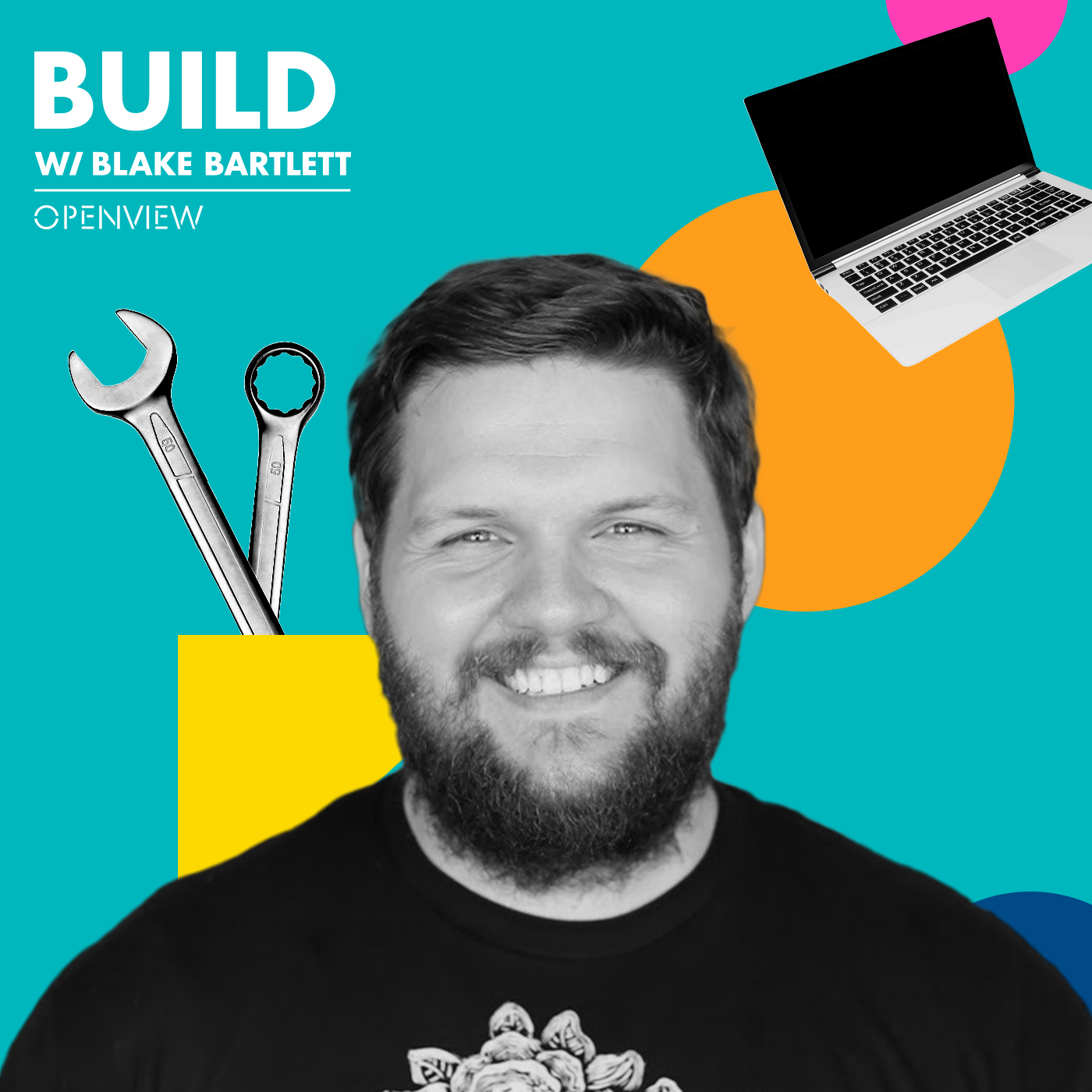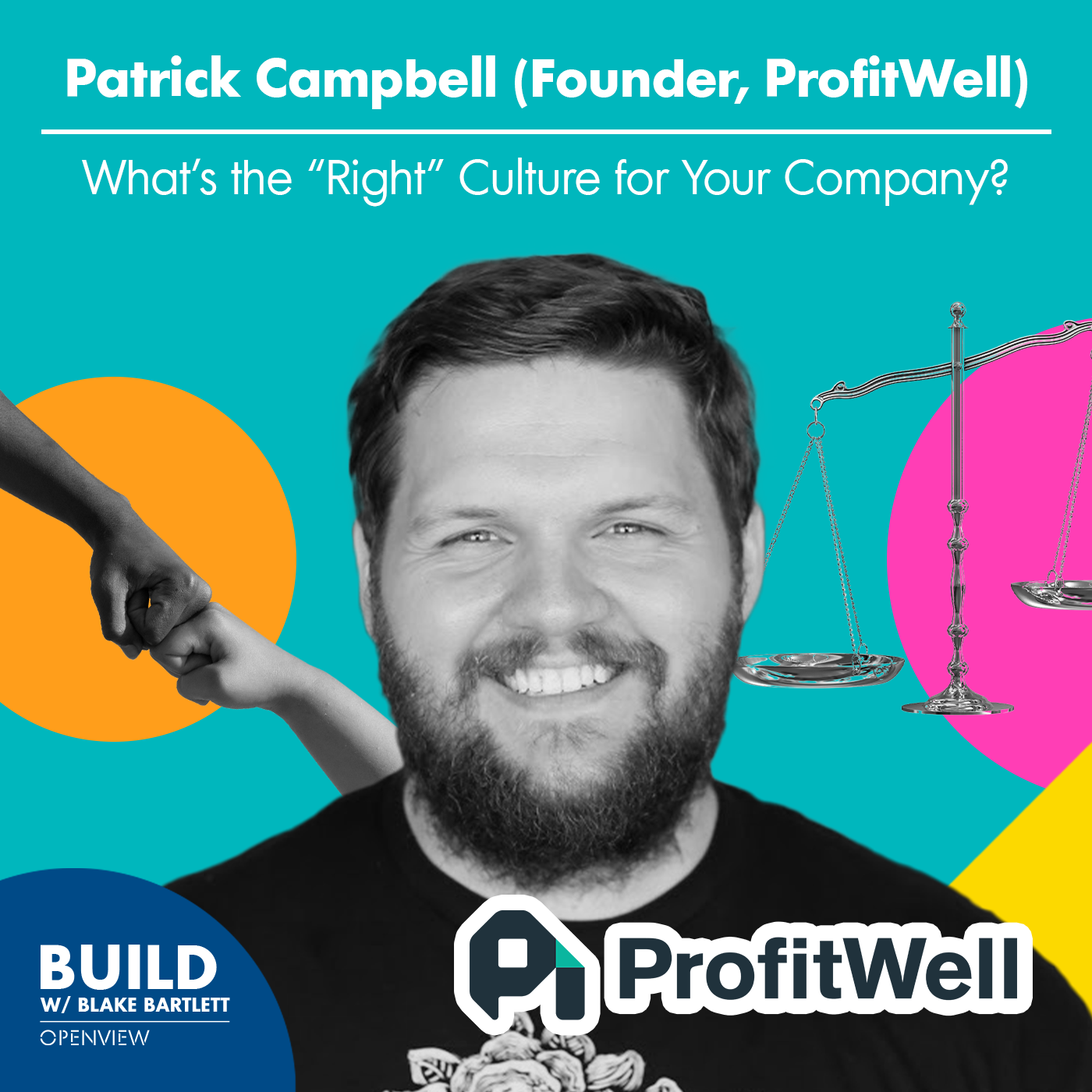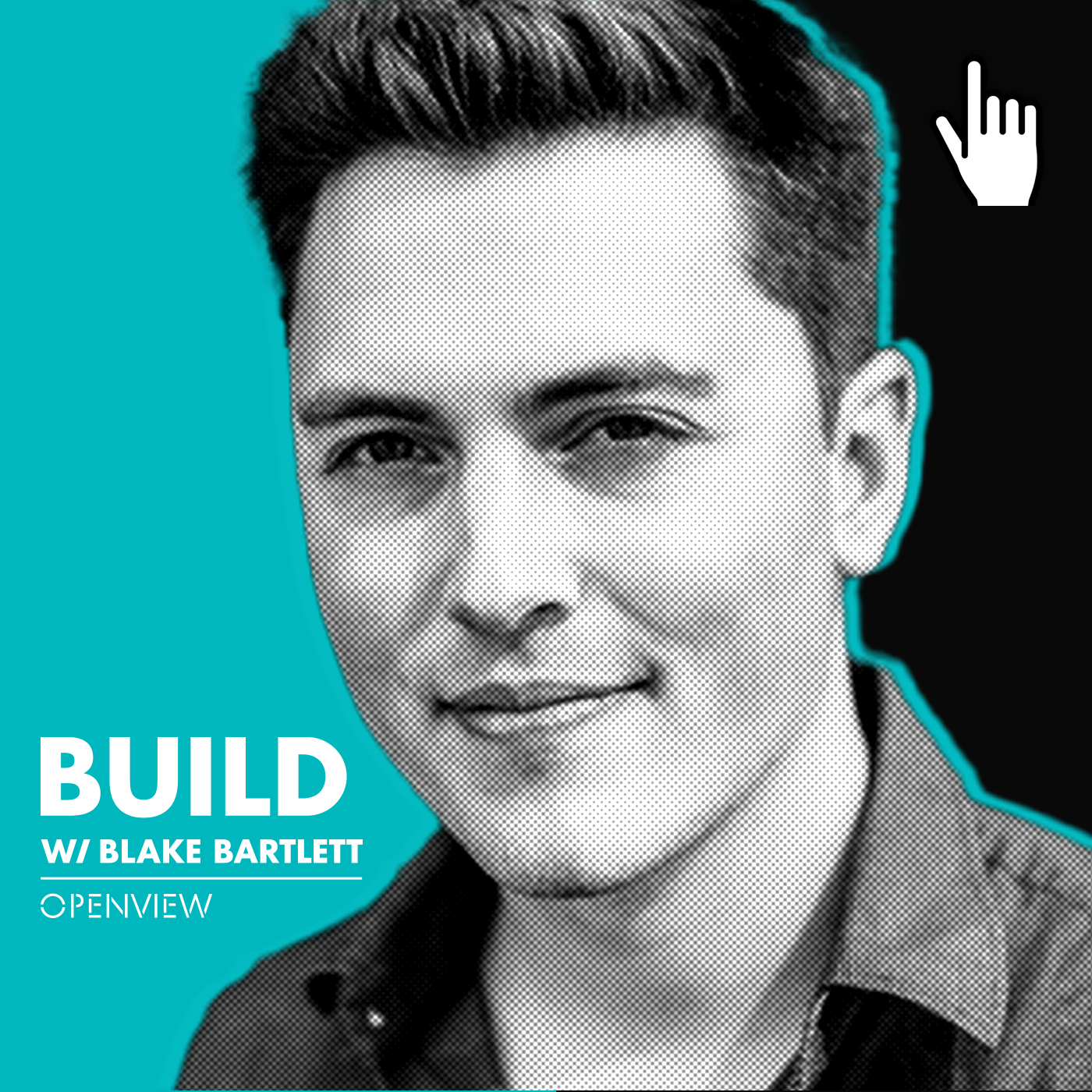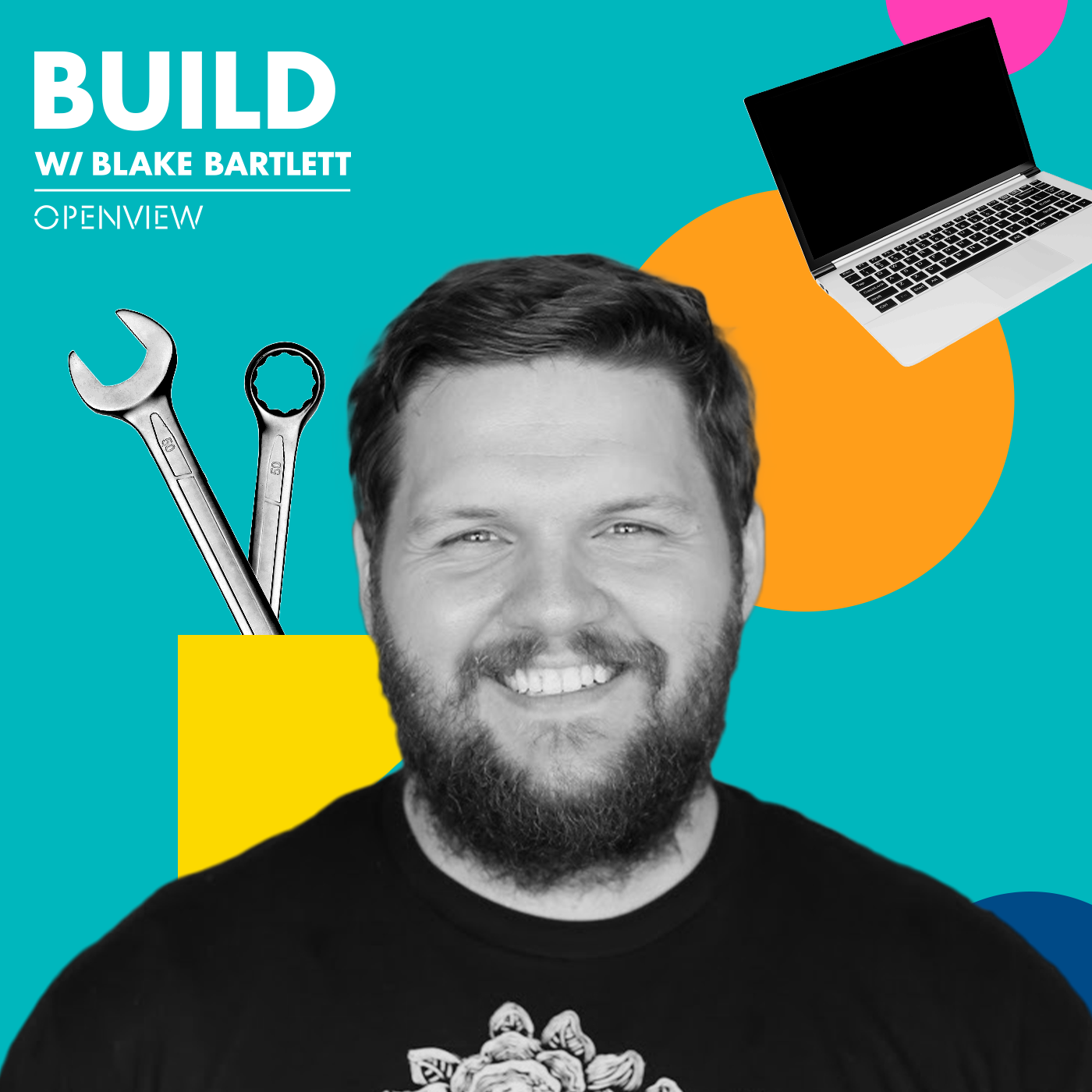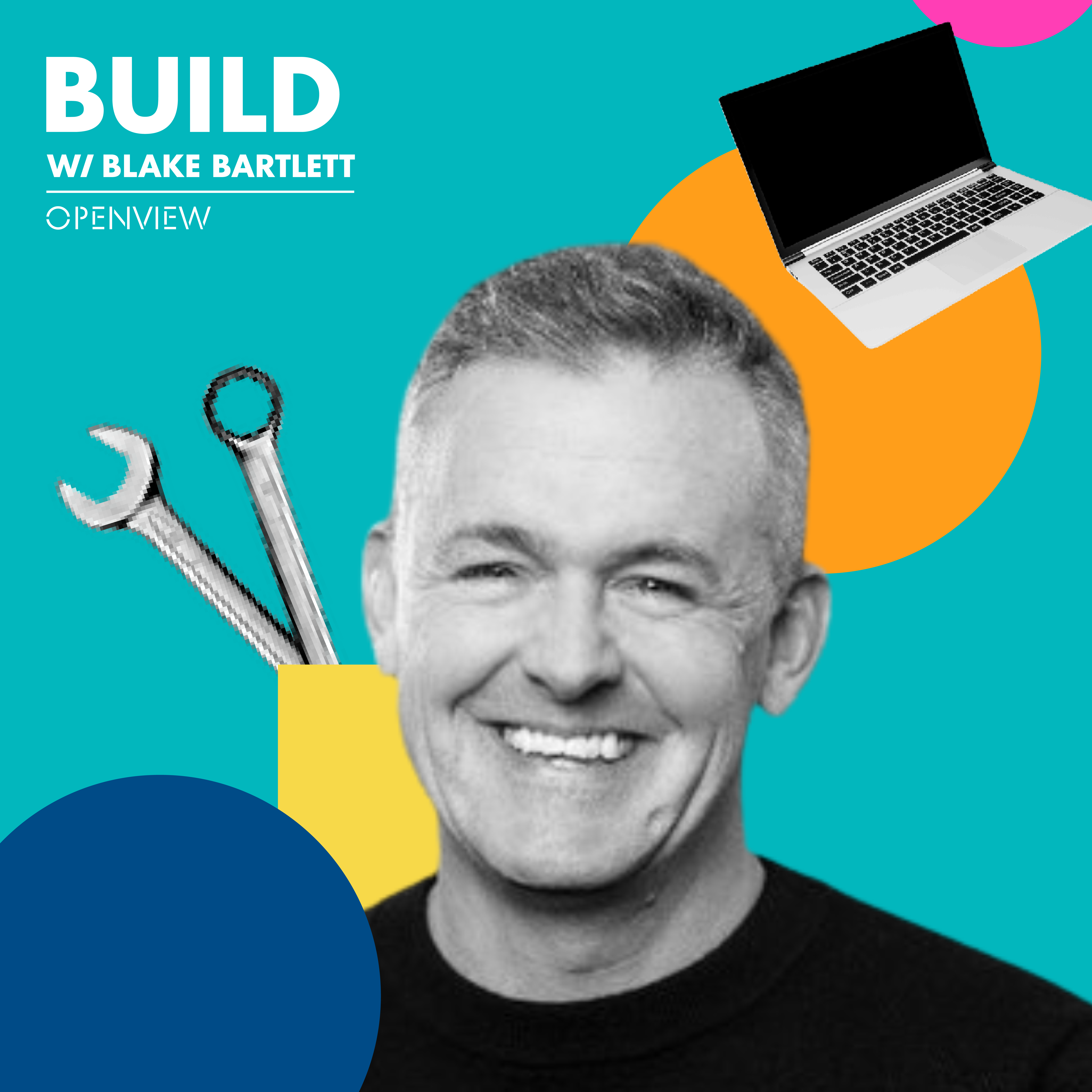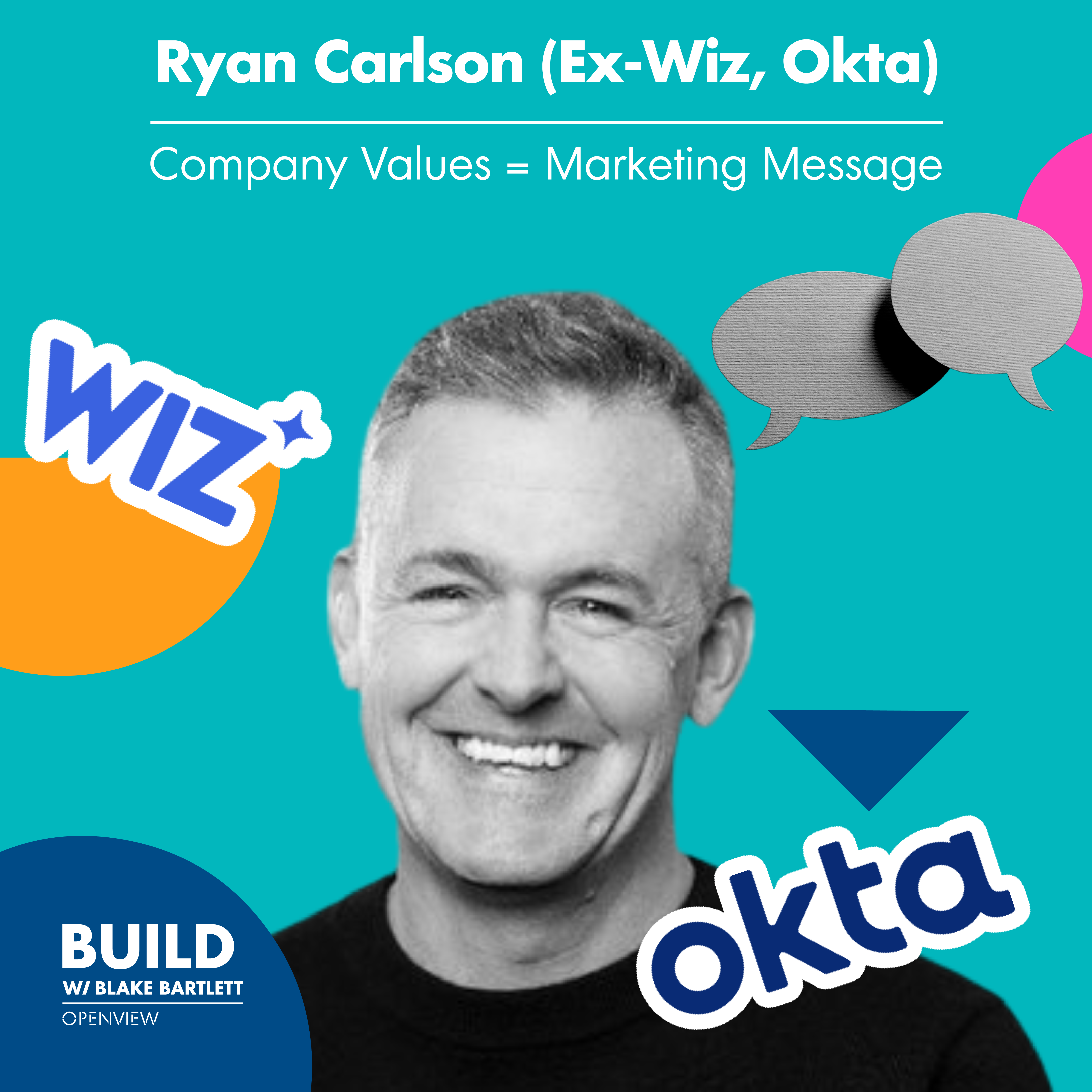Patrick Campbell (ProfitWell): What’s the “Right” Culture for Your Company?
- 0.5
- 1
- 1.25
- 1.5
- 1.75
- 2
Blake Bartlett: Coming up on today's episode of BUILD.
Patrick Campbell: The most practical things are: Make sure there's an entire interview dedicated to questions about whatever you're trying to test with culture. And those questions, it's not like, " What do you think about being disagreeable," right? You can't ask those types of questions. You have to design questions that basically will pull this out of someone or give you some signal.
Blake Bartlett: Ah, company culture, the topic that almost everyone has a radical opinion about, but very few folks have actually nailed in practice, especially in the startup world where the day- to- day is rather chaotic. Our guest today on BUILD is Patrick Campbell, founder and CEO of ProfitWell. He built the company as a bootstrap startup all the way to an acquisition by UK- based Paddle for$ 200 million last year. Patrick has gone through the full startup journey and the intense challenge that comes with it to define culture and put it into practice in real life. In our conversation, Patrick and I talk about the many cultural platitudes and myths that exist in the startup world, his path to defining the right culture at ProfitWell, and how to avoid the common startup pitfall of creating an overly accommodating culture, which comes with the best of intentions and the worst of results. All that and more on today's episode of BUILD. So let's dive right in with Patrick Campbell. Well, Patrick, thanks for joining us here on the BUILD podcast. It's great to have you on the show.
Patrick Campbell: Thanks for having me, man. Just jealous of that hair. That's just the perfect haircut, I feel. It's the haircut I want, the haircut I can never have, that's how I feel about it.
Blake Bartlett: Well, thank you. As many people know, it actually started with COVID. All the barbershops closed and most people went of course back a couple months later, and I have just kept it going for almost three years now, so...
Patrick Campbell: You're like, " I'm just going to keep going."
Blake Bartlett: Yeah. So we're talking about culture today. Maybe we'll just start with the intro sort of set of things here, which is what is the role and importance of company culture in today's market environment given everything that's going on?
Patrick Campbell: Yeah, I think, well, culture is one of those things that any first time founder, when I was a first time founder and someone was like, " Oh yeah, culture's going to be the most important thing," I thought that was the dumbest statement and dumbest piece of advice that anyone could ever give me. Because you think, oh, it's going to be the product, or it's going to be marketing or it's going to be sales, or there's going to be some competitor or something like that. But at the end of the day, your company, once you get over a certain size, it's the people. That's the operation that you're building. And to answer your question, I want to say culture is everything, but I feel like that's really trite. That's a tweet that you end up kind of retweeting but don't really know exactly what it means. So to give you something a little bit more concrete, culture is basically the behaviors that you accept and the behaviors that you tolerate within your business. That's really what it is. And when you get into trying to build a startup or trying to build a scale up or whatever we want to call it, your goal is to go and grow as quickly as humanly possible, if you're choosing that path, some folks choose more of an indie path, which is fine. But with that, the behaviors that you accept and tolerate are either pushing you forward and giving you that success and that speed that you're looking for or they're holding you back and they're a big drag on your system. And so, when you start to look at this in a very practical lens, you start to realize a lot of us are really bad at culture. A lot of us are unintentional with culture. And the one silver lining to harder times is all of a sudden it forces you to really think about what are those behaviors that we want to accept and tolerate and one of those behaviors that we don't want to tolerate, and ultimately that makes the business work or function or not. And so there's a lot of people who are thinking about their cultures finally for the first time. Some of them are really rethinking their cultures. And then folks who have figured this out, they're not doing great because obviously there might be layoffs or there might be things like that, but they're definitely sitting there and they're more calm than a lot of other folks.
Blake Bartlett: My initial perception of culture is like, is it a cool office? Obviously not culture. And then, I think next misperception was like, " Oh, people are happy, people like working here and our culture is to make everybody happy." And no, that's not really exactly culture either. And then ultimately landed exactly kind of what you're talking about, it's more about the behaviors we accept and the behaviors that we tolerate and that we don't tolerate. It's more about: What are we here to do? How are we going to do that? How are we going to interact and behave with each other as we're doing that, how are we going to make decisions and it's both defining how are we're going to do it, which has the photo negative of it, the inverse of it, which is like what are we not going to do? How are we not going to make decisions? And creating those rules of the road for how we're going to operate as a company.
Patrick Campbell: Well, and that's the scariest part because, for me, ProfitWell was my first company and I had worked at some larger entities before and then one startup. And I think that when I started, I thought it's all accommodating. It's all happy. It's the thing that you just mentioned. And it's a crucial mistake because you already have this founder brain, this founder anxiety typically, and if you're a first time exec, you have exec anxiety, where you're like, " Well, if this person leaves, who doesn't feel right from a cultural standpoint," and that that's not code for, I don't like them, that's not code for, I wouldn't want to have a beer with them, that's code for the way they handle anxiety or confrontation, the way that they think about work, the way that they perform work. If they're not a fit there, at least I can try to get some effort out of them. At least I can try to get some work out of them. Or if someone comes to you and they're a great team member from a performance standpoint, but they end up basically being a bad culture fit and they're causing all this consternation, it's like, " Well, I can't lose them." And that accommodation is really, really painful. And the thing that I've kind of come up with, I don't think I'm the person that came up with it, but it's like you want to be essentially homogeneous or not diverse on your culture or your values at all. And then you want to be extremely diverse in everything else. And so the things that you accept, are you a culture of transparency? We are going to be non- negotiable on transparency or whatever we are defining our transparency as, but Susan has this background and Susan comes from this place. That's amazing. And then Billy has this background, I don't know, it's a 1950s novel I guess with the names I'm going after. But Billy has this background, amazing. They're so different. They're bringing all this perspective, but they all align and all buy in to that cultural, that value, that principle that we want to build this company with.
Blake Bartlett: So we're starting to get into it a little bit with your own journey, building the culture and crafting and refining the culture over time because it is always a work in progress at ProfitWell. But maybe let's start there. How would you describe the culture of ProfitWell and the journey to get there?
Patrick Campbell: Honestly, what I like to do, and this is famous last words, because people are going to go, " look," I start by going to our Glassdoor reviews and I want to see the intense liking of ProfitWell's culture and the intense dislike of ProfitWell's culture. And I want to understand what people are saying. Now, you're going to make a ton of mistakes. If your first Glassdoor review that's negative, you take it super personally, most of the time because you messed something up, that person either shouldn't have worked there or they had a bad experience that truly was bad because you were early on or they just weren't a fit and you didn't let them go early enough and everything built up and resentment built up. But I look at what people say, and intensity was a big thing that people talked about and some very much disagreed with it, disagreeableness in a constructive way, that was a really big thing. This most charitable interpretation, this is the thing that we talk a lot about. And also performance culture was a big thing that kind of came up. And so those are the things that I look at. Those are the things that we want people to say. And when you look at our Glassdoor reviews, you will see people on one hand, very, very positively about that. They love that, they can't get enough of it. And then on the negative side, you'll see people who they think it's terrible, they take it to the, " This is a terrible place to work," et cetera. And I think what's great about that when I look at that is that's what caused us to start actually taking our culture seriously. Not because we weren't defining these things, but we weren't kind of defending the line when we were hiring. We weren't defending the line when people were cultural mismatches and letting them go. Because it's not that they're bad or good, it's not that we're better or they're worse, it's literally, it's just not a fit for them if they have a problem with how we handle these things or how we think about these things. And there's a lot of tactical things that we did, I'm sure we'll get into, but I think that's where I go to really understand if we're hitting the mark. And then obviously, little tactical tip, anytime there's a negative review and a positive review, respond to the Glassdoor reviews. A lot of people try to get rid of it. A lot of people try to minimize it, sue Glassdoor, there's people who do. And it's like, listen, well, you weren't a match for that person. Now is it them? Is it you? Is it doesn't matter. The buck stops with you. You got to take ownership of it. And if you go to our Glassdoor, when you see a lot of those negative reviews, I write novels and I go and I say, " Hey, this specific situation, here's another way that we look at it. Hey, I'm really sorry about that situation. We weren't a good fit here." Or, " Hey, we messed up." We had a guy who... Not to talk about Glassdoor as much, I haven't talked about Glassdoor in a while, but it just kind of made me think of it. Our Salt Lake City office, when we opened it, the chairs were taking six weeks to get there. I think it was like 10 weeks they were delayed, something crazy like that. So we just had dining room chairs. And they were great. They weren't great chairs, but they were the chairs in the office and were bootstraps. So we're like, " Yeah, these chairs," and, " Hey, are you good with the chairs?" And everyone was like, " Fine." Well, that's the thing the guy wrote about in the Glassdoor review after we let him go, " They wouldn't even get chairs." And it's like, you know what? We were getting chairs. They were delayed. It's also the-
Blake Bartlett: We were trying, man.
Patrick Campbell: But it's the scrappiness, right? And that's okay. It's like, listen, we are a scrappy culture. And then we were upfront with that. We were able to afford chairs later in life. But it's just one of those things where it's like, all of that's an opportunity to take ownership of your culture and look at it and be like, " Yeah, we should have just gone down to Home Depot and gotten some chairs." Or it's like, " Yeah, you know what? We should be really upfront that these are the types of situations that'll happen because of our scrappiness and if you're not on board, go." I think he was right at the end of the day here. I think we were being a little too trusting of delivery times. But anyways, I think we can move on from that little thing that I've been thinking about for six years now.
Blake Bartlett: No, but it's interesting on the Glassdoor point, because I do think people view it like they view all of the other review sites. It's like, " I want to win it. I want to have 100% positive and five stars across the board." But it's really interesting that you point out that the goal is not a hundred percent positivity, it's a hundred percent accuracy, in some ways. That people love the culture for the things that you've designed in the culture to be that way. And the people that are negative, it's because like, " Hey, this was the culture, and that's not my vibe." But it's more about accuracy than just always winning and getting the top score.
Patrick Campbell: Well, and that's the thing too, a lot of our early ones, we've failed so long because we were so accommodating. We had these values and we believed these values, but we just had people who didn't fit. And what happened is we kind of kept going or trying to explain or trying to really well- intentioned like change them because we just felt we think this is the way to build and this is the way to think about the world. And if it's a mismatch, we're like, " Let us convince you." And it's like, values, that's baked in your life, in your childhood. It's not something that all of a sudden you're going to wake up one day and be like, " Yes, I really value taking the most charitable interpretation, assuming positive intent." If you struggle with that, I'm not going to be able to convince you. And so I think that was a big thing. And you see those reviews sometimes pop up when it's like you haven't defined and defended, therefore what's the person's option but to have a bad experience and then complain, and then you can sit there and get really mad about it, or you can be like, " Yeah, we messed up there." Even if we've done on everything right, there's still something that we can learn. And I think when you have a hundred percent reviews in Glassdoor, there's either a lot of astroturfing that happens or you're a large enough company that you got programs and stuff that really large companies, most people should love working there if they're in... whatever that means in terms of the culture, which isn't ping pong tables and offices like you said.
Blake Bartlett: So I want to get into some of those cultural tenants that you define. But before we do that, I do want to spend a little bit more time on this idea of a culture of accommodation. I see this a lot with startups, especially in the early days, they can basically fall into that, fall into, " We have a culture of accommodation," and later realize why that sort of creates so many problems. But talk a little bit more about that and what that looks like in real life.
Patrick Campbell: Basically, if you believe everything, you believe nothing, right? That whole concept. And so the culture of accommodation is basically what we would do early on is, I kind of already said this, but to give a little bit color to it, there's this thing we believe in, and it's a little controversial, like 90% of you listening to this are going to be like, " Okay, that makes sense, that's reasonable." And then 10% of you are like, " I would never want to work with that guy ever." And then probably say he's terrible and all this other stuff. I'm exaggerating, but that's kind of what happens. And we can talk deeper on that. But we have this view of what's called the most charitable interpretation. It's basically assume positive intent. Blake, I just made a comment about your hair in the opening. I meant it as a compliment, but maybe you're really sensitive about your hair and I said the wrong word or something. Well, what we kind of taught at ProfitWell was like, let's say you had a negative reaction. You have a couple of choices. The first choice is you can basically go, " Patrick doesn't know I'm hung up about my hair. It didn't bother me that much. I'm not going to say anything. I'm going to move on. If it happens again, I'll say something." Or you can have a negative reaction and be like, " I think Patrick was just trying to help, but he didn't know this, so I'm just going to say something. Hey man, sorry, I really don't like when people comment on my hair." And I'm going to go, " Oh, I'm so sorry. I'm sorry. Let me not try to have happen again." Or you can have a really negative reaction. Or if you really can't give those first three things, you go to a manager. If you can't go to a manager, you go to another manager. If you can't go to another manager, go to an exec. If you can't do that, you go to HR. So it's just an order of operations in terms of how you handle conflict, because we're all adults, and unfortunately adults aggravate people sometimes, whether intentional or unintentional. And so that concept is something that most people are like, " Yeah, that makes sense." Some people have a very hard time with that, and they're like, " Well, what if this happens? What if that happens? Well, if this happens, this happens." And their instinct is to go right to a manager or right to HR. I don't judge it. I don't think it's the right way to do things in terms of how we think we want to build. And so what we would do is we would talk about this, we would proselytize it across the organization. We would try to convince people of it, but there was a small group of people that this just wasn't great. And we tried to accommodate them and be like, " Well, it's okay. Maybe..." We tried to give them the most charitable interpretation of that particular instance. And it just caused all this conflict. It caused all this resentment for those people, and they weren't having a good time even though they were liking their work. And that was really hard because we just kept accommodating. And same thing happened with people... We didn't have any stone cold jerks, thankfully. We were pretty good at filtering that even when we weren't great at filtering in general, but we would accommodate poor performance because we would be like, " Well, they really need to be good at this thing for this role. They're not quite there, but I think we can train them. I think we can get them there." And it was really well- intentioned, but it was like, I'm going to teach someone in six months how to be an amazing critical thinker now that they're in this role that requires critical thinking? It's really well- intentioned arrogance. It's so arrogant to believe that I could do that, but it's again, accommodating. And I think that the culture of accommodation happens at a lot of companies, especially the past few years, because you're like, " Talent's getting more expensive. Oh my God, we're going to need to hire so many people. We're not going to be able to get to this goal." And then you end up having this culture that all the high performers, all the people who are great fits, don't want to be there because you're not really putting your money where your mouth is when it comes to your culture. And so that's kind of what I mean by an accommodating culture. And I think so many people fall prey to it because it's the path of least resistance. And unfortunately, it creates more resistance than you think.
Blake Bartlett: And a lot of time that resistance is unspoken. The term that's popular or has been popular recently is quiet quitting. And that typically refers to people coasting. But you could also have this quiet quitting where people are like, " The accommodation thing isn't working for me. I'm a high performance individual, and we're not talking about performance. We're not delivering results. So I'm not going to tell anybody. I'm just going to go get another job," and you find out after the fact. Just a quick break in today's conversation to make sure that you're getting all the latest in PLG content from OpenView. First things first, if you haven't subscribed to BUILD in your favorite podcast app, make sure you do that now. We drop four episodes per month and subscribing is the best way to stay in the loop. And while you're at it, drop us a rating and review for the show so that others can find it as well. And secondly, did you know that I'm a YouTuber? I put out weekly videos on the latest and greatest in PLG with my show called the PLG 123. Every video is two minutes or less and features VC perspectives from yours truly on the latest in VC, SaaS, and of course, product- led growth. So find me on YouTube by searching Blake Bartlett and make sure to subscribe to my channel so that you don't miss a single video. Okay. Now, let's dive back into today's conversation. Oh, I wanted to double click into a couple of the values that you had mentioned. We already talked about most charitable interpretation. There was another one you mentioned, which was, I think you said it was disagreeableness and the right amount of that. What is that all about?
Patrick Campbell: So we had principles, and then we had some behaviors that we really talked about, and there were four principles. And behavior was the most charitable interpretation piece. The other thing we had, which is a little controversial, was treat people like adults. And it sounds a little condescending or a lot condescending if you're a little sensitive to that language. And we stole it from Netflix. But the basic idea was like, if you really think about how you treat someone like an adult, it's, " Hey, Blake, I didn't like that you did that. Hey, Blake, that was great what you did," right? I have integrity with talking to you. When there's a decision of should we tell the team or not? You're like, " Well, they're adults, let's tell the team." So that was a behavior. But one of our principles was be disagreeable, think critically. And the reason that we had that was the default behavior that so many people have is not to be disagreeable. If you think about it, there's power structures inside companies. The founder- CEO, even though the founder- CEO is sitting there and is like, " Please tell me what's wrong. Please give me feedback. I need it. Help me make this all better." It's like, " Well, if I tell them the wrong thing, are they going to fire me? Or am I not going to get a good promotion?" All these other things. And then, there are some founders that are like that, they're terrible because they use that power, and you should always be a servant leader, which means that your team should have the power. And so this concept was almost like a hedge to that behavior. It was like, no, your job, your job is to be disagreeable. Your job is to think critically about things. And when you see a problem, you should say, " Hey, I think this is a problem." And 80% of the time it's going to be like, "Yeah, yeah, we thought of that, thank you, blah, blah, blah. That was awesome, but we're still going to move forward." But it is one of those things that was so important, and it jars people a little bit like, " Oh, I'm supposed to be disagreeable." And it doesn't mean be a jerk. It doesn't mean you have an excuse to be a jerk. But it does mean when you're looking at something, if someone asks for feedback, you should give some critical feedback of some sort with plenty of positive feedback as well. So that's really what we mean by that. And I think another way that some companies talk about this is disagree and commit, but they focus so much on the commit part where you disagree and you commit, but most people don't even disagree. They don't even bring up that disagreement. And what disagree and commit really means if you read High Output Management with Andy Grove, those were two separate things. It was like, yes, you have to disagree, and then even if you're still in disagreement, you commit. It wasn't just, " Hey, commit if you disagree with something." So yeah, that's a little over overzealous explanation of be disagreeable and think critically.
Blake Bartlett: Yeah, it's kind of because you could hear that and draw the conclusion, which would be the wrong conclusion to draw, which is, "This is a culture of jerks and I have to be a jerk to work here." And it's like, no, that's not what we mean by disagreeable. Really what we're getting at is that we're anti group think, and we're anti opacity in the sense that if you have a thought in your head, you keep it in your head. It's like, no, we want to get that out there. And we don't want people just going along with the flow and just making decisions for perceived political reasons. It's like, no, we want the actual answer. We need to get to the best way to approach this so we get the best results. And we're only going to get that if people are actually speaking their mind about what they're seeing and presenting it in the most charitable way and being human about it, but not skirting around the issue.
Patrick Campbell: And what you just described was one of the hardest things for us because remember, we were very accommodating. We were like, " Oh, if they don't like us, they're going to leave and we're going to fail." And then it was also really hard for some folks who came on board or were thinking of coming on board. One, it was hard for us because not just the accommodating culture, but values are normally too fluffy. They're normally like" be honest," things like that. And one of the most helpful things I ever heard about values, I heard it from Kyle Porter of Salesloft, but I think other people had said it, was, if your values or your principles don't have a trade off, they're not values, they're not principles. Because if you don't have to give something up or you don't have to be willing to give something up, and for us, we are willing to give up a little bit of comfort. We're willing to have a little anxiety because when someone disagrees with you, no matter how disagreeable you are as a person, there's always a little bit of hurt, a little bit of hurt. It should never be dramatic. It should never be like you said, being a jerk or worse. But it is one of those things that that means that someone's going to come to you and be like, " I don't think this is the right way to do this because X, Y, Z." And sometimes they're not going to give it the best way for you because they don't know the best way for you. And that's offset by the most charitable interpretation. And we're willing to have that in the culture. And I think it was hard for certain groups of people on the team when we were really locking this in place. So what we started doing is we gave people outs, but even in the hiring process, we started actually codifying these particular values in true memos. Like, " Hey, this is what this means. This is what it is, this is what it's not." Now it's a nice little tagline of be disagreeable, but this is what this means. And we would send that to folks before they would even accept an offer and just be like, " Hey, this is how we handle the types of things. If it's not good for you, it doesn't mean we're better. It doesn't mean you're worse, et cetera. It just means that we're not right fit for you and let's find you another company." And we would help people. I would literally intro people that weren't good fits and they're like, " Hey, it's not for me." And I would intro them to other companies that I knew were, not the inverse necessarily, but didn't have that type of thing that they were going to struggle with. And we have this privilege in this world because we're not digging ditches and we have this privilege of being able to sit at our computers and record podcasts all day and stuff like that. And so it's like, yeah, take the privilege, be a little choosy, go to a culture that you fit because you do have a lot of options out there.
Blake Bartlett: I think what you're describing there is a really interesting way to think about the concept of cultural fit, which for the most part in the last, call it, five to 10 years has gotten a bad rap because that's been a euphemism for people that I like or people that are like me. And it can become this opt out. That's one way, but really there's a lot of bias in it. But the way you're describing cultural fit is something that's a transparent communication in the hiring process. You are evaluating the candidate for cultural fit based off of an objectively defined set of criteria and definition that go with those values and principles and behaviors. But you're also introducing that to the candidate of, " Here's how we operate." Are you cool with that? It's this double opt- in process to make sure that everybody's on the same page and that there's no sort of negative surprises one way or the other.
Patrick Campbell: Yeah, a hundred percent. And that's where... So I started doing all of the final interviews because when you're trying to hire someone, there's can they do the job and can they do the job at the level that is required, which changes per role? And two, the culture fit piece, and there's a bunch of things that branch off of that. But in terms of the way we started hiring is we would have a struggle with the skillset piece. And so that's what we focused a lot on. And then, I was the dam at the end in terms of sometimes we were having people who were great, but the culture wasn't getting through. And so we designed that final interview to be completely about culture. That's kind of what I did. And the first half hour was I asked them a series of questions all of those questions are the same for every single candidate. And then the last half hour, they could ask whatever they wanted and we could talk about whatever they wanted. And they would do a little bit of a culture screen the first interview, which is a really common thing in recruiting, but this was the thing to get them excited or convince them that this wasn't... Really, that was the goal is like, " Hey, these are all the reasons you might hate this job." Not doing that in a very directly way because you're trying to sell a little bit still in a candidate, but that's where we decided to do it. And then, it really helped us a lot because most of the time, I would say 90% of the interviews I did, it was just getting them excited because everything fit. There was enough screening beforehand, but there were about 10% interviews where it either wasn't a fit because of some reason, or it was like they opted out because they were like, " Oh, this is not the way that I'm going to want to handle this," or, " This is not the culture that I want to be at," which is totally fine. Absolutely okay.
Blake Bartlett: So shifting gears for the last few minutes here into practical advice. If you've gone through this exercise of defining or redefining, and then you're moving to the point of putting it into action, we've already touched on this a little bit, but what does that look like to put it into action? To make your culture something that's not just theoretical, but actually the real life experience of folks?
Patrick Campbell: The most practical things are make sure there's an entire interview dedicated to questions about whatever you're trying to test with culture. And those questions, it's not like, " What do you think about being disagreeable?" You can't ask those types of questions. You have to design questions that basically will pull this out of someone or give you some signal. And there's plenty of different types of questions out there. So a couple that I did and give one somewhat controversial one, the non- controversial one, I would ask people, " What are the five happiest moments of their life?" And then, " What are two of the top 10 worst moments of their life?" I'd always say, " You don't have to give me the top two because that might be too personal, but two just really bad moments." And what that really helped kind of uncover was like team player aspect, are they performance orientated? Are they not? Because I'm not trying to be an amateur psychologist and judge their answers, but also how much are they willing to share? We're an early stage company. Sharing a lot, not necessarily about your life specifically because everyone does have some separation from work, obviously, but it was very much opened them up and allowed you to see a bunch of anecdotes or at least the anecdotes that they were willing to share. And we would have people who were uncomfortable with those two questions. They were just uncomfortable. They didn't think it was professional. It's like, yeah, we're definitely not the place for you. Those was people mostly were coming from corporate. And then, I think case studies, as many case studies you can do, little mini case studies are really important. The one we used for testing MCI or most charitable interpretation, which again, bit of a controversial stance depending on your proclivities or how you think about the world was, and I would set this up much better than I am going to now. So I'm publicly going to say it in a way that will get me probably flack, but I promise you, made sure everyone was safe, made sure everyone understood. But what I would say is like, " We're going to give you this case study. There's no right answer. There really is no right answer. But let's say we're in Slack, someone shares some sort of report or something they found online and they said,'Oh, I found this interesting.' And another person replies to that person and goes,'Oh, I saw that too and I thought it was...' And they use the R- word to describe it." So that's essentially how I set it up. And then I say, " What do you do?" And people will ask some questions sometimes. And really all I'm looking for is someone who's like, " That is not great. It's not professional. I'd go talk to the person, or depending on X, Y, Z, I may go talk to another person to see what's going on, et cetera. And here's how we'd resolve it, et cetera," which is the most common answer. But 10% of the time I would hear, " That person should be fired immediately." And I would go, " Okay, but what if they're over 50, and that word was an actual medical term back in the day, it was a medical term. Does that change your mind?" " No." Some people would go, " Oh, I didn't even think about that. Yeah, that might change my mind. Maybe we need to talk to them or something like that." But most people would go, " No." " What if their dog died that day, they're just so emotional and they know they did wrong, but they just let it out?" " No, it doesn't change my answer." And I would explain to them, I'd be like, " Listen, I totally get it. Here's how we would handle it. I would DM them and be like,'Hey, come on.' Especially if I knew them, I'd be like, 'What's going on there?' et cetera." And so we would handle it like how most people would want it handled, but I don't know, we'd have to understand what happened before we would just instantly fire them. We'd have to understand. We'd have to look into it. We would definitely be like, " Hey, can you delete that, please?" That would definitely happen. And I always tell people I've never heard anyone use that word at ProfitWell ever, but it is one of those things like that's how we would handle it. And it's a very, in my opinion, elegant kind of little case study because it kind of exposes them to a really important behavior that we think about. But it doesn't in a way where I'm like, " Listen, I've never actually heard anybody, and I hope to God this never happens," but there's probably a lot of examples. Someone says the F- word, people have a problem with the F- word, those types of things. And I've never heard someone go, " That's totally fine." That probably would get them not going forward in the interview process as well. But I think you have to set up those little case studies. And then outside of the interview, then in the review process, we set up our whole performance review process where it was based on performance one, two, or three, no decimal places, meets expectations was two, and then culture one, two, and three, how much they live the principles basically in their team, one, two or three. Two was meets expectations. And most people are going to end up being twos on everything, which is totally great. I would argue anyone who was a one on culture ended up basically getting asked to leave or ended up quitting pretty quickly. But this allowed us to have just accountability to this. And that's the thing, you're not going to get this perfectly. So just having accountability in those little milestones where you can go, " Oh yeah, Jeff did this thing, and the way he handled that situation, was that like a incident or was that kind of a common thing? Oh, it's a common thing. All right, we should have a conversation with Jeff and get him to another place because that makes the most sense." But really it's the performance review and then that interview process. It's super, super crucial. And the third and last thing, I struggled with this a lot because it just didn't make sense to me. We codified all the values. Oh, here's the memo. This is the memo that explains this. But you have to permeate them throughout the conversation within the company. And this was the thing that I was really bad at. In your all- hands, reference the values as to why something is good. " Hey, in the spirit of transparency, blah, blah, blah, blah, blah. This whole situation came about in this way and so- and- so did a really good job being disagreeable there. That was amazing. That was awesome. And we were able to figure out that this was a problem." Have everything come back to those values because then people keep hearing them besides their performance review and besides their interviews, and then they start doing the same thing. " Hey, in the spirit of being disagreeable, I'm not trying to be a jerk, but I don't think this is the right way of doing things." And that's when you're like, chef's kiss, we finally got there, although it doesn't happen a hundred percent of the time. So hopefully those are helpful. But those are the three areas that we really honed in on.
Blake Bartlett: Yeah. Extremely helpful. And this whole conversation has been perfect, Patrick. To walk through the value and importance of culture, and not in a platitudinous way, but in real life. Like, why is this thing valuable? The downsides of getting it wrong or being too accommodating, how to define it and go through that exercise, and then how to action it and put it into practice every single day. So this has been awesome. Thank you so much for joining us here on the BUILD podcast today.
Patrick Campbell: Thanks for having me, Blake.
Blake Bartlett: Thanks for listening to this episode of BUILD. If you like what you've heard, leave us a review on Apple Podcasts and subscribe to stay up to date with all the new episodes. Want more insights from OpenView? Follow me, Blake Bartlett, on LinkedIn for daily PLG content, and head to our website to sign up for our weekly newsletter.
DESCRIPTION
Culture at a startup is always tricky, but there’s one common mistake founders should avoid at all costs. It’s the desire to make everyone happy all the time. Patrick says this leads to a “culture of accommodation” which ultimately ends up not working for anyone. Hear Patrick’s journey as a founder to define the culture at ProfitWell, and how you can do the same at your startup.
Mentioned in this episode:
Sign up for OpenView's weekly newsletter
Connect with Patrick on LinkedIn
Follow Patrick on Twitter
Subscribe to Blake Bartlett on YouTube.
Podcast produced by OpenView.
View our blog for more context/inspiration.
Today's Host
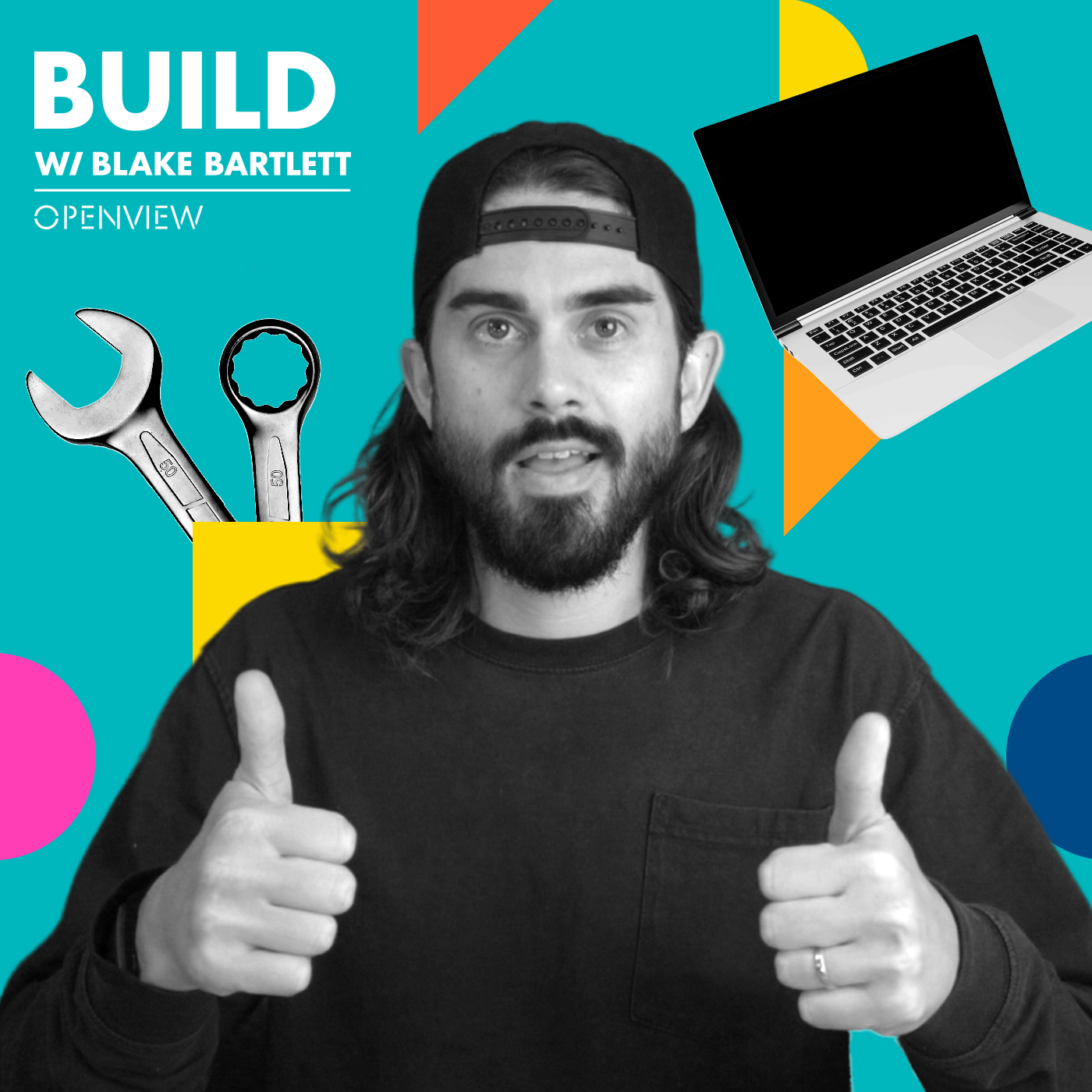
Blake Bartlett
Today's Guests
